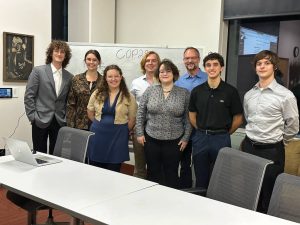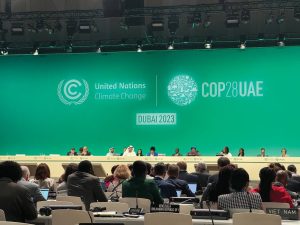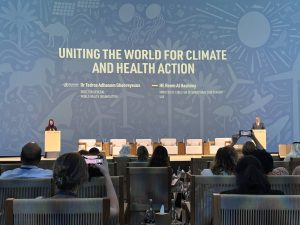

’Roos engage with global climate leaders
By Cary S. Wacker
Dubai, United Arab Emirates, is halfway around the world from Sherman, Texas, but it no longer seems as remote for seven students. The first-ever group of Austin College Climate Ambassadors traveled there in December as official observers to the United Nations Climate Change Conference (also known as COP28). The event is the annual gathering of almost 200 nations to shape world climate action.
Planning for the journey began in 2022, when physics professor Dr. David Baker, Adams Observatory Co-Director and Donald MacGregor Chair in Natural Science, applied for Austin College to be granted official observer status as a research or educational institution—a process that takes 10 months for approval.

Ultimately, Austin College received U.N. badges for three observers. With COP28 spread over two weeks, the College maximized the opportunity by sending a different group each week of the conference. Baker and associate professor of biology Dr. Keith Kisselle, Department Chair of Environmental Studies, each accompanied a group. Badge access rotated among the Austin College
delegates.
To prepare, students enrolled in a Fall Term class focused on climate science, policy, communication, and solutions. Each Climate Ambassador investigated a specific topic related to the environmental issues on the COP28 agenda. Once in Dubai, each group attended sessions in the “Blue Zone,” the U.N.-controlled area where heads of state and environmental ministers negotiate policy. They also explored the “Green Zone,” an area hosted by UAE with exhibits, panel discussions, artists, lobbyists, and entrepreneurs.
While traveling, the students shared their experiences in Dubai on the Climate Ambassadors’ official Instagram account and via a live Zoom broadcast back to campus. The groups reported on topics as varied as water security in food systems, the relationship between health issues and climate change, and rising temperatures’ impact on habitat.

Austin College Climate Ambassadors also worked with students from Juniata College and Swarthmore College (both in Pennsylvania) at the COP28 conference to document important climate negotiations and to advance undergraduate representation at COP. “Early-researcher participation is critical for climate progress,” said Baker. “The purpose of the official observers is to serve as an avenue for transparency and to report on policy decisions.”
The trip yielded some extraordinary experiences: witnessing the historic vote to implement a global Loss and Damage Fund that will assist vulnerable countries affected by catastrophic weather; hearing world leaders speak, including then-U.S. Climate Ambassador John Kerry and French President Emmanuel Macron; and personally meeting U.N. Secretary-General António Guterres.

Back on campus, Austin College students will work throughout Spring Term 2024 to enhance public awareness of climate issues and accelerate meaningful climate solutions. Their participation in the U.N. Climate Conference is another marker of the College’s commitment to caring for the environment. “AC Climate Ambassadors engaged with climate leaders from around the world. We hope to inspire meaningful climate solutions that make sense for our local communities,” Baker explained.
As the students like to say, “There is no Planet B.”

Photos Courtesy of Dr. David Baker
